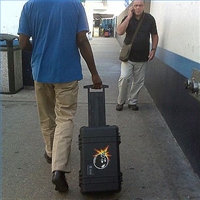Body-Scanning to Be Used in Airports as Anti-Terrorist Measure
Within three weeks full-body scanners will be used in Amsterdam's Schiphol Airport to scan people traveling to the United States, after consultations with U.S. authorities, the Dutch interior minister said on Wednesday.

The ministry also said ordinary security procedures were followed properly in the Christmas Day handling of Umar Farouk Abdulmutallab, who is accused of trying to blow up a flight from Amsterdam to Detroit.
Dutch Interior Minister Guusje Ter Horst told a news conference in The Hague there was no evidence that Abdulmutallab had been to the Netherlands before the flight. The investigation is continuing into whether Abdulmutallab had assistance in Amsterdam, the ministry said, Reuters reports.
It was also reported, federal authorities are increasing the number of high-tech scanners in use at Indianapolis International Airport after the Christmas Day bombing attempt on a U.S.-bound passenger jet.
The measure is part of a ramped-up screening process by the Transportation Security Administration that includes more passenger pat-downs, double-checking carry-on luggage and limits on cabin movements in the last hour of a flight.
The agency will be using three more of the scanners at the airport, TSA officials said, in addition to one that already had been used. The body-scanning technology is in at least 19 U.S. airports.
These machines, which can cost six figures each, screen airline passengers without physical contact. Officials contend the scanners have the potential to find items that conventional X-ray machines might miss, such as plastic or chemical explosives and non-metallic weapons, Indianapolis Star reports.
News agencies also report, body-scanning technology, which can reveal plastic or chemical explosives or non-metallic weapons, might have prevented the Christmas Day attempt to blow up a jetliner that landed in Detroit. The suspect in that case, who was believed to have hidden explosive material in his trousers or underwear, didn't go through a full-body scan when his flight began in Amsterdam, though the Dutch airport has such a unit.
The scanner "could have been helpful in this case, absolutely," said Evert van Zwol, head of the Dutch Pilots Association.
"It's incredible that this guy wasn't subject to more than routine scans," said Vincent.
Ed Yohnka, director of communications for the American Civil Liberties Union of Illinois, said it's puzzling that full-body scanners are being seen as a solution, when officials had knowledge about Abdulmutallab that they didn't use.
Subscribe to Pravda.Ru Telegram channel, Facebook, RSS!





